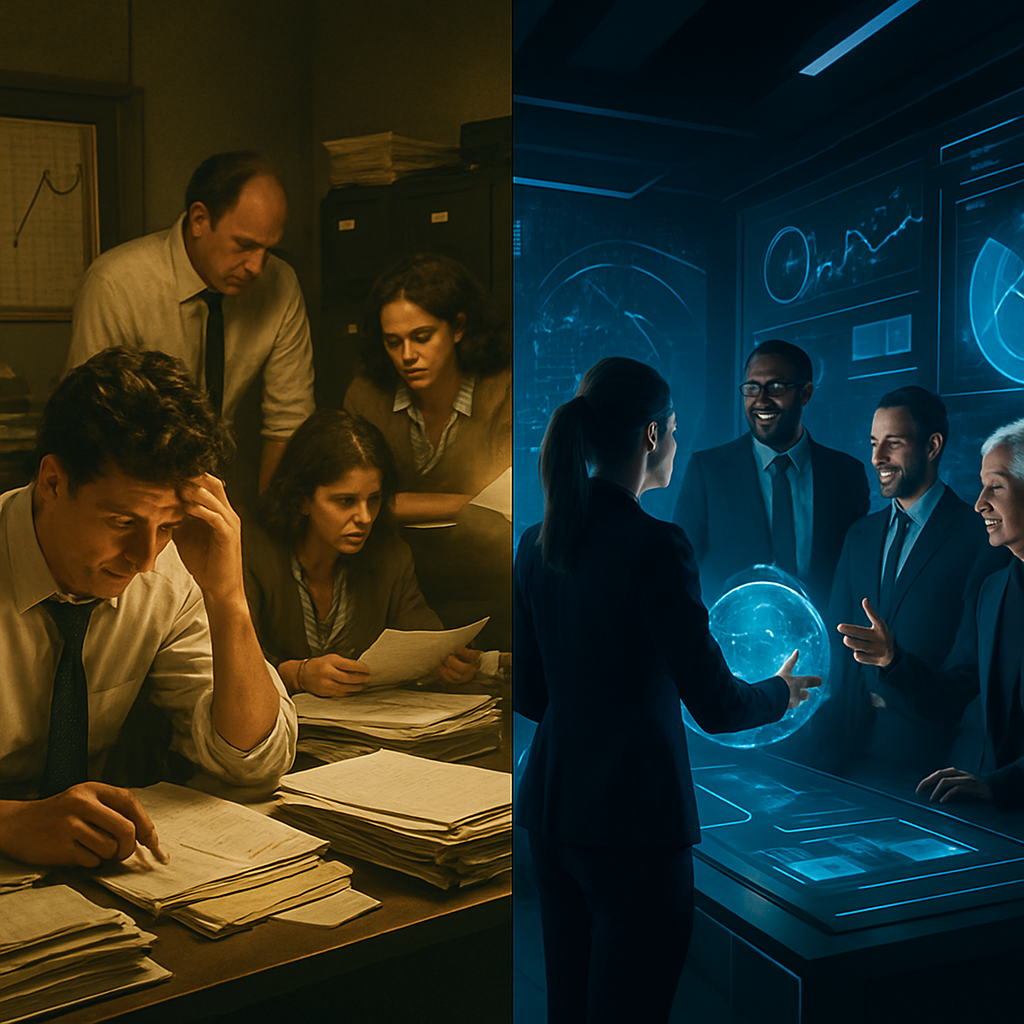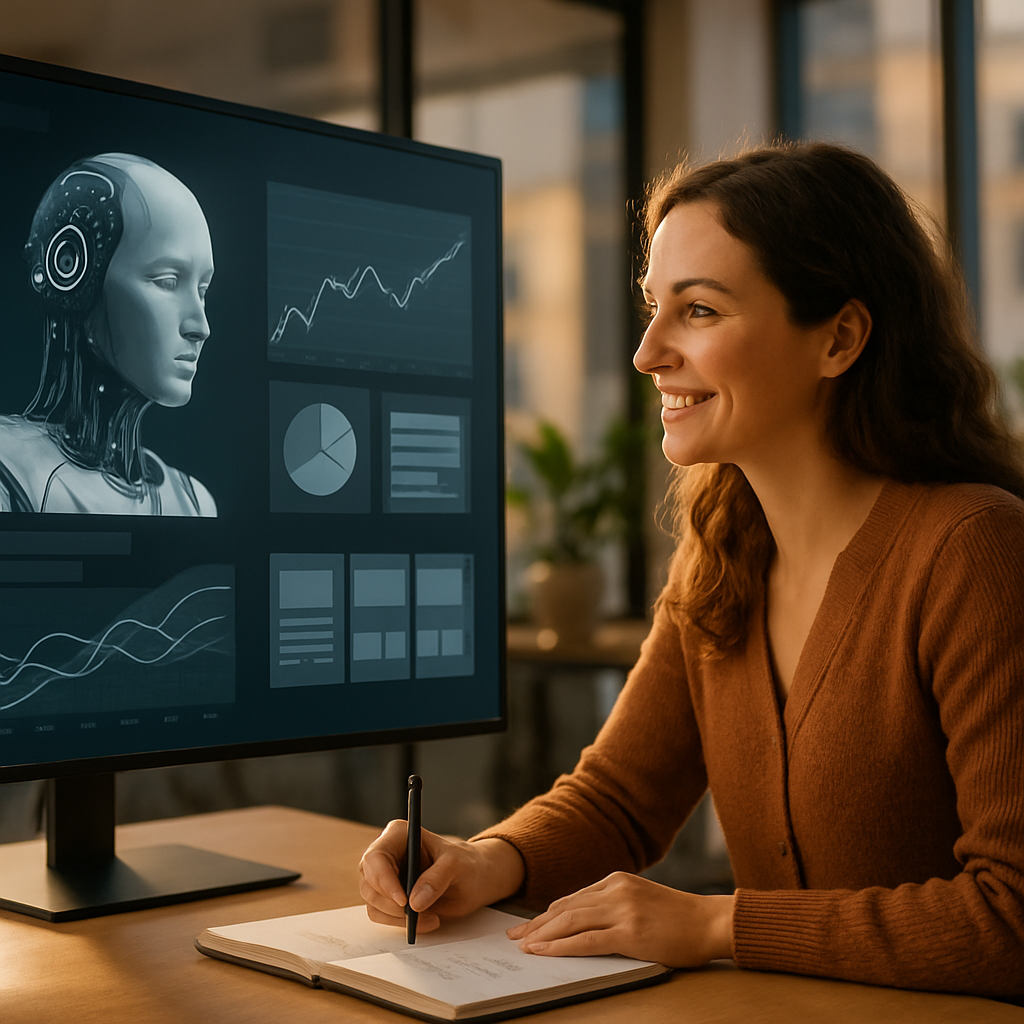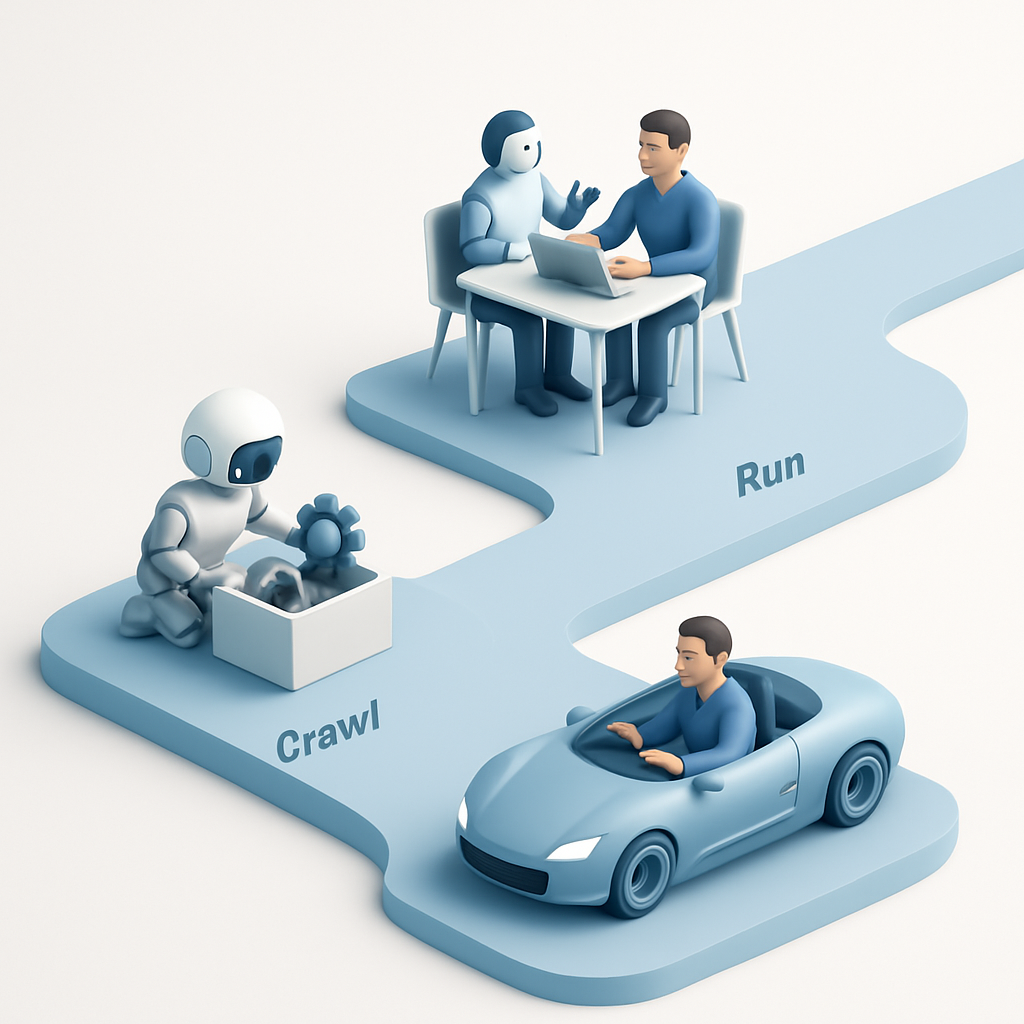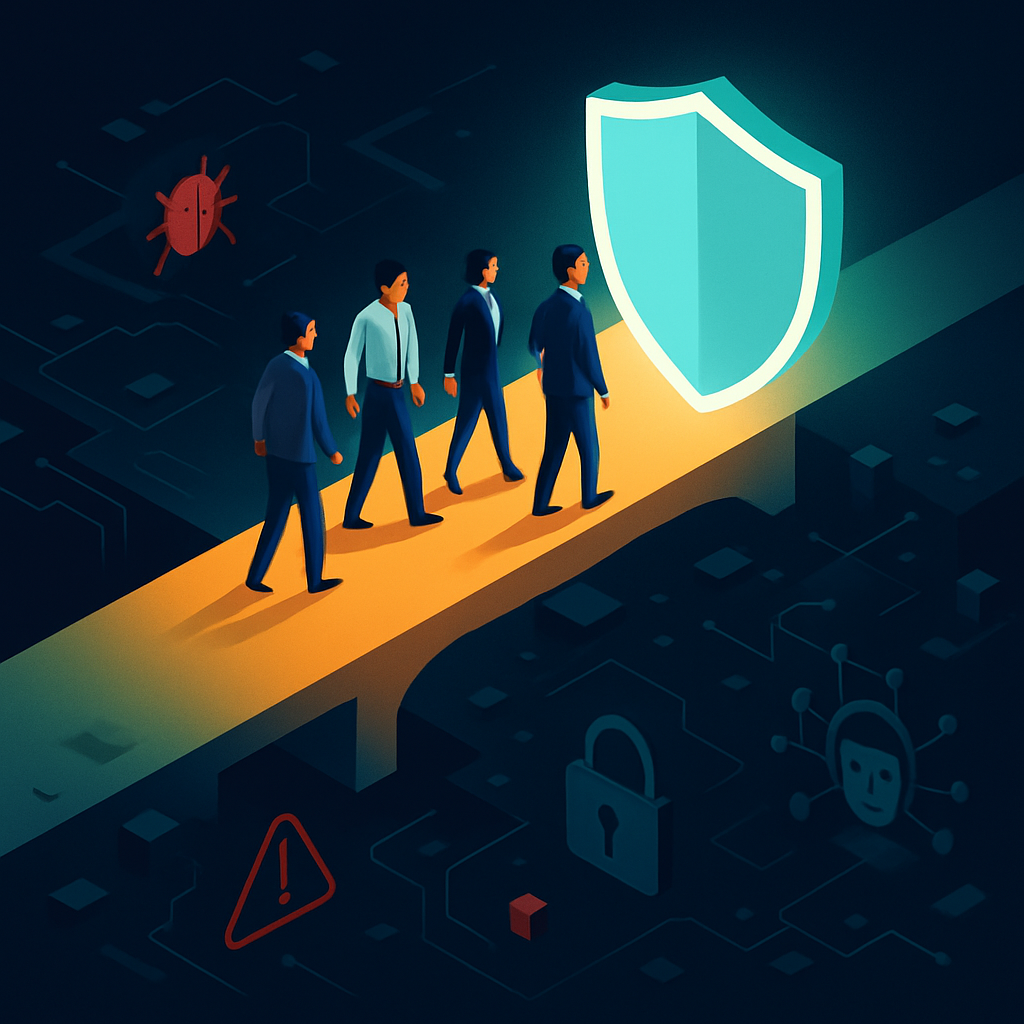AI & Marketing Agency Disruption: The Definitive Playbook to Thrive

For marketing agency leaders, the rise of Artificial Intelligence isn't just another trend—it's a seismic shift that brings a mix of exhilaration and existential dread. You see the headlines, you hear the buzz, and you feel the ground moving beneath the traditional agency model. The fear is palpable: will AI make your services obsolete? Will it replace your team? How can you possibly keep up?
Let's be clear: this is not another superficial list of AI tools. This is the definitive strategic playbook for agency decision-makers. The uncertainty ends here. We will provide a clear, actionable path to navigate the marketing agency disruption, implement AI intelligently, and transform this perceived threat into your greatest competitive advantage.
This playbook will guide you through understanding the fundamental disruption, adopting AI with a phased 'Crawl, Walk, Run' approach, proving its ROI, managing the inherent risks, and, most importantly, future-proofing your talent. It's time to stop reacting and start leading. It's time to thrive.
- The New Reality: How AI Is Fundamentally Disrupting the Agency Model
- The 'Crawl, Walk, Run' Playbook: Your Phased Approach to AI Adoption
- Proving the Payoff: Building the Business Case for AI Investment
- Navigating the Minefield: A Framework for Responsible and Secure AI
- Future-Proofing Your Agency: Cultivating the Talent and Culture for Tomorrow
- Conclusion: From Threat to Thrive
- References & Sources
The New Reality: How AI Is Fundamentally Disrupting the Agency Model
The current AI revolution is more than just an efficiency upgrade; it's a fundamental rewiring of the agency-client relationship and the very definition of marketing value. While many focus on AI's ability to automate tasks, its true impact lies in reshaping strategic capabilities. As publications like MarTech.org have noted, the evolution of agency-brand partnerships is accelerating, demanding a new level of technological integration and strategic counsel[1]. This isn't about agencies being replaced; it's about them being redefined.
The disruption goes beyond technology. It’s a strategic challenge that forces agencies to re-evaluate their core business model. Insights from the Forbes Agency Council highlight that clients no longer just want execution; they expect partners who can leverage technology to uncover deeper insights and drive unprecedented results[2]. For a comprehensive overview of AI's broad impact across industries, McKinsey's State of AI Report provides essential context.
Beyond Automation: Redefining Agency Services and Value
The most significant shift is from task execution to strategic oversight. AI is commoditizing the "what" (e.g., writing 500 words of ad copy) and amplifying the value of the "why" and "so what" (e.g., directing an AI to create campaign variations that resonate with a nuanced audience segment). This elevates the agency's role from a service provider to an indispensable strategic partner.
Consider the evolution of core agency services in this "Then vs. Now" framework:
- Content Creation (Then): A copywriter manually researches and writes a blog post over several hours.
- Content Creation (Now): A content strategist directs an AI to generate multiple drafts, data-driven outlines, and SEO variations in minutes, freeing the strategist to focus on narrative, brand voice, and high-level content architecture.
- Media Buying (Then): A media buyer manually analyzes past performance reports to adjust bids and targeting parameters.
- Media Buying (Now): An AI algorithm performs predictive analysis in real-time, optimizing bids across thousands of variables, while the human strategist focuses on audience discovery, creative testing strategy, and overall campaign ROI.
- SEO (Then): An SEO specialist manually performs keyword research and on-page optimization.
- SEO (Now): An AI-powered SEO tool identifies semantic keyword clusters, predicts search intent, and automates technical audits, allowing the specialist to focus on competitive strategy and creating a superior user experience.
The Evolving Agency Workforce: From Replacement Fears to Role Augmentation

The most pressing question for many is: "Will AI take my marketing job?" The overwhelming consensus is no, but it will fundamentally change it. The fear of replacement is giving way to the reality of augmentation. As Narine Galstian, CMO at SADA, articulated in a Forbes article, AI will handle the repetitive, data-heavy tasks, "freeing up marketers to focus on what they do best: strategy, creativity, and building human connections"[3].
This perspective is echoed by industry observers like MarketingHire, who emphasize that AI will transform, not eliminate, jobs[4]. The mundane tasks that burn out talented marketers—manual reporting, data entry, initial research—are the first to be automated. This doesn't make the marketer obsolete; it makes them more strategic.
This shift is also creating entirely new roles within the agency structure. We are seeing the rise of positions like:
- AI Prompt Engineer: A specialist who crafts sophisticated prompts to elicit high-quality, on-brand outputs from generative AI models.
- AI Strategist: A senior role responsible for identifying opportunities to embed AI across client accounts and internal workflows.
- Marketing Automation Architect: An expert who designs and integrates complex AI-powered marketing and data ecosystems.
For a deeper analysis of how technology is shaping the future of employment, Wharton's Guide to AI and the Future of Work offers valuable insights into this workforce evolution.
The 'Crawl, Walk, Run' Playbook: Your Phased Approach to AI Adoption

The sheer scope of AI can lead to analysis paralysis. Where do you even begin? The key is to avoid a "big bang" implementation and instead adopt a phased, strategic approach. Leading advisory firm Gartner recommends starting small, focusing on specific use cases, and integrating AI with existing tech stacks rather than ripping and replacing everything at once[5].
This "Crawl, Walk, Run" framework provides a manageable, scalable path for any agency to begin its AI journey, build momentum, and ultimately achieve mastery.
Crawl: Starting Smart with Low-Risk, High-Impact AI
The "Crawl" phase is about building confidence and demonstrating value with minimal risk. The focus is on internal process automation—using AI to make your own agency smarter, faster, and more efficient. These are quick wins that improve your bottom line before you ever introduce AI into a client deliverable.
Key Actions:
- Automate Client Reporting: Use AI tools to automatically pull data from multiple platforms (Google Analytics, social media, ad networks) into a single, insightful dashboard. As a provider to over 7,000 agencies, AgencyAnalytics has highlighted how AI can dramatically streamline this once-tedious process[6].
- Supercharge Market Research: Leverage AI to analyze thousands of customer reviews, social media comments, and articles in minutes to identify emerging trends, pain points, and competitive messaging.
- Streamline Internal Workflows: Automate tasks like transcribing meeting notes, summarizing long documents, and generating first drafts of proposals.
Walk: Integrating AI into Core Client Deliverables
Once you've mastered internal applications, the "Walk" phase involves integrating AI as a "co-pilot" in your client-facing work. This is where AI begins to enhance the quality and efficiency of your deliverables, directly benefiting your clients. The key here is human oversight; AI assists, but the strategist directs.
Key Actions:
- AI-Assisted Content Creation: Use generative AI to brainstorm ideas, create outlines, and produce first drafts of blog posts, social media updates, and ad copy, which are then refined by human editors for brand voice, accuracy, and strategic nuance.
- Hyper-Personalization at Scale: As noted by tech leaders like IBM, AI's ability to analyze customer data allows for unprecedented personalization in email marketing and website experiences[7]. Use AI to segment audiences dynamically and deliver tailored messages.
- Predictive Ad Optimization: Implement AI tools that predict which ad creatives and audience segments are most likely to convert, allowing your team to allocate budget more effectively and proactively.
Run: Building Proprietary AI Solutions and New Revenue Streams
The "Run" phase represents the pinnacle of AI maturity. Here, your agency moves beyond using off-the-shelf tools and begins to leverage AI as a core differentiator, creating proprietary solutions and new, high-value revenue streams. This is where you become a true technology-enabled partner, creating a defensible moat around your business.
Key Actions:
- Develop Custom AI Models: For sophisticated clients, build custom AI models trained on their specific data to solve unique business challenges, such as predicting customer churn or identifying high-value sales leads.
- Offer AI Strategy as a Service: Package your expertise into a standalone consulting service, helping clients develop their own AI roadmaps. This transforms you into an "AI Transformation Partner (ITP)," a role that can command high-value projects in the $100k–$250k+ range.
- Build AI-Powered Products: Develop a proprietary software tool or platform that solves a common industry problem, turning your agency's intellectual property into a scalable product.
The Agency AI Tech Stack: A Use-Case-Based Tool Directory
Choosing the right tools is critical. Instead of a generic list, a "Use-Case-Based Directory" helps you map specific technologies to your agency's needs. Authoritative sources like the Digital Marketing Institute emphasize selecting tools that solve a clear problem within your workflow[8].
Agency Function: Client Reporting & Data Analysis
- Tools: AgencyAnalytics, DashThis, Adverity
- AI Use Case: Automates data aggregation from multiple sources, identifies performance trends, and generates natural language summaries of key insights.
Agency Function: SEO & Content Strategy
- Tools: SurferSEO, MarketMuse, Jasper AI
- AI Use Case: Performs semantic analysis to guide content creation, generates SEO-optimized briefs, and creates first drafts of articles and copy.
Agency Function: PPC & Media Buying
- Tools: Adext AI, Phrasee, Google Performance Max
- AI Use Case: Optimizes ad spend in real-time with predictive analytics, generates high-performing ad copy variations, and automates campaign management.
Agency Function: Email & Marketing Automation
- Tools: HubSpot (Marketing Hub), Klaviyo, Seventh Sense
- AI Use Case: Determines optimal send times for individual recipients, personalizes content at scale, and predicts which leads are most likely to convert.
Proving the Payoff: Building the Business Case for AI Investment
For any agency leader, investment decisions come down to ROI. Moving beyond the hype requires building a solid business case that resonates with stakeholders and justifies the allocation of time and resources. This isn't just about efficiency gains; it's about unlocking significant new value.
Quantifying the Opportunity: The Trillion-Dollar Impact of AI on Marketing
To grasp the scale of the opportunity, we can look to top-tier economic analysis. A landmark report from the McKinsey Global Institute estimates that generative AI could add the equivalent of $2.6 trillion to $4.4 trillion in value annually across the global economy. Crucially, the report identifies "marketing and sales" as one of the four areas that will capture about 75 percent of this total value[9].
This isn't just a future projection. The same research indicates that businesses that invest wisely in AI automation can reduce operating expenses by 20–40%, freeing up capital for growth and innovation[9]. These are not marginal gains; they represent a fundamental shift in economic potential that no agency leader can afford to ignore. For a direct look at the data, you can review The economic potential of generative AI report.
The In-House vs. Outsource Decision: When to Hire an AI Automation Agency
As you move along the adoption curve, you'll face a critical decision: build your own AI capabilities or partner with a specialized firm? There's no single right answer, but a clear framework can guide your choice.
Build In-House When:
- You have a long-term vision for a proprietary AI solution.
- You have existing technical talent that can be upskilled.
- The AI application involves highly sensitive, core intellectual property.
- You are prepared for the significant investment in time and resources.
Hire an AI Automation Agency When:
- You need to achieve results quickly and lack in-house expertise.
- Your goal is to automate specific, well-defined business processes.
- You want to leverage the experience of specialists who have implemented similar solutions for other businesses.
- You want to "rent" expertise to de-risk your initial foray into AI.
Firsthand accounts from entrepreneurs on platforms like Reddit's /r/Entrepreneur reveal that a good AI Automation Agency acts as a strategic partner, identifying high-impact automation opportunities and building custom workflows that integrate seamlessly with your existing operations[10]. When vetting a potential partner, ask for detailed case studies, client references, and a clear explanation of their development and maintenance process.
Navigating the Minefield: A Framework for Responsible and Secure AI
Embracing AI's power comes with a profound responsibility to manage its risks. The threats are real, moving beyond job disruption to include significant cybersecurity, legal, and reputational challenges. To truly thrive, agencies must adopt a proactive stance on AI governance. For a detailed technical guide, the NIST AI Risk Management Framework is an essential resource.
The U.S. Government Accountability Office (GAO) has developed a robust AI Accountability Framework that provides an excellent foundation for any organization, outlining four key pillars: governance, data, performance, and monitoring[11].
Understanding the Real Threats: Cybersecurity, Data Privacy, and Bias
Agency leaders must look beyond the productivity gains and understand the operational risks. The U.S. Department of the Treasury has highlighted the unique cybersecurity risks posed by AI, which require specialized mitigation strategies[12].
Key threats include:
- Data Poisoning: Malicious actors can intentionally feed an AI model bad data, corrupting its outputs and leading to flawed marketing decisions or security vulnerabilities.
- Model Bias: An AI trained on biased data can produce discriminatory or offensive outputs, leading to brand damage and legal challenges. The Federal Trade Commission (FTC) has been clear that consumer protection laws apply to AI, holding businesses accountable for unfair or deceptive outcomes[13].
- Data Privacy & Security: Using AI tools to process client or customer data creates new obligations for data security and privacy compliance, especially with regulations like GDPR and CCPA.
For more specific information on compliance, the FTC Guidance on AI in Advertising is a critical read for any agency.
Your Responsible AI Checklist: An Agency Governance Framework

To translate high-level principles into daily practice, agencies need an actionable checklist. Adapted from the GAO's AI Accountability Framework[11], this checklist provides a starting point for building your own governance model.
Governance:
- Have we designated a clear owner for AI strategy and risk management?
- Have we established a formal policy for the ethical and acceptable use of AI tools?
- Do we have a process for vetting new AI vendors for security and compliance?
Data:
- Do we know the source and quality of the data used to train the AI models we use?
- Do we have the proper rights and permissions to use client data with AI tools?
- Are we taking steps to identify and mitigate potential bias in our data sets?
Performance:
- How are we testing AI-generated outputs for accuracy, relevance, and brand safety before they go live?
- Do we have clear metrics to measure the performance and ROI of our AI initiatives?
- Is there a "human-in-the-loop" process for reviewing and approving critical AI-driven decisions?
Monitoring:
- Do we have a system for continuously monitoring AI performance and detecting anomalies?
- Do we have a plan to respond if an AI system fails or produces harmful output?
- Are we regularly reviewing and updating our AI governance policies as the technology evolves?
Future-Proofing Your Agency: Cultivating the Talent and Culture for Tomorrow
Technology is only half the equation. Long-term success in the age of AI depends on your people. As the Boston Consulting Group notes, leaders must take a holistic approach that accounts for AI's impact on talent, organizational structure, and culture to capture its full value[14]. This involves not only teaching new skills but also addressing the psychological aspects of change and fostering an environment where innovation can flourish.
The Great Skill Shift: What Your Team Needs to Learn Now
The demand for certain marketing skills is declining, while others are becoming more valuable than ever. Agencies must guide their teams through this "Great Skill Shift." Insights from career platforms like MarketingHire[4] and academic institutions like Park University[15] show a clear trend away from manual execution and toward strategic thinking. For a broader perspective on this shift, refer back to Wharton's Guide to AI and the Future of Work.
Here’s how skills are evolving:
| Old Skill (De-emphasized) | New AI-Powered Skill (Amplified) |
|---|---|
| Manual keyword research | Strategic topic clustering & search intent analysis |
| Repetitive social media posting | Community strategy & creative direction for AI content |
| Manual data entry for reports | Data interpretation & storytelling with AI-generated insights |
| General copywriting | AI prompt engineering & brand voice editing |
| A/B testing setup | Predictive creative analysis & hypothesis generation |
The most future-proof skills are uniquely human: strategic thinking, creativity, empathy, ethical judgment, and complex problem-solving.
Leading the Change: How Agency Leaders Can Foster a Culture of Innovation
The final piece of the puzzle is leadership. Your team will look to you to navigate the uncertainty. Fostering a culture that embraces AI, rather than fears it, is paramount. Leaders on the Forbes Agency Council consistently emphasize the need for open communication and creating safe spaces for experimentation[2].
Actionable steps for agency leaders include:
- Communicate a Clear Vision: Articulate how AI will make the agency stronger and empower your team, not replace them.
- Invest in Training: Provide access to courses, workshops, and certifications to help your team build the new skills they need.
- Create an AI "Sandbox": Give your team access to AI tools in a low-risk environment where they can experiment, learn, and fail without fear.
- Reward Experimentation: Celebrate and reward team members who find innovative ways to use AI to improve processes or deliver better client results.
- Lead by Example: Actively use AI tools yourself and share your own learnings and challenges with the team.
Conclusion: From Threat to Thrive
Artificial Intelligence is not a passing trend or a simple upgrade to your tech stack. It is a fundamental transformation of the marketing landscape and the very DNA of the agency business model. The disruption is real, but so is the opportunity. The agencies that merely dabble in AI will be left behind, while those that embrace it strategically will dominate the future.
By moving beyond fear and adopting a deliberate, phased approach—Crawl, Walk, Run—you can de-risk the journey and build sustainable momentum. By proving the ROI, managing the risks responsibly, and cultivating a future-proof culture, you transform AI from an existential threat into your most powerful engine for growth and innovation. You now have the playbook. The time to lead the revolution is now.
Ready to accelerate your AI adoption and leapfrog the competition? Partnering with a specialized AI Automation Agency can provide the expertise and momentum you need. Contact us for a strategic consultation to build your agency's AI roadmap.
This article provides strategic guidance and information. The implementation of AI involves various factors unique to each business, and results are not guaranteed. Readers should conduct their own due diligence before investing in new technologies or partnerships.
References & Sources
- MarTech. (n.d.). What AI means for the future of agency-brand partnerships. Retrieved from https://martech.org/what-ai-means-for-the-future-of-agency-brand-partnerships/
- Forbes Agency Council. (n.d.). Blog posts on AI's influence and challenges. Forbes Councils. Retrieved from https://councils.forbes.com/blog/ai-influence-media-and-advertising-agenices
- Forbes. (2023, June 23). Will AI Lead To The End Of Marketing Jobs?. Forbes Agency Council. Retrieved from https://www.forbes.com/councils/forbesagencycouncil/2023/06/23/will-ai-lead-to-the-end-of-marketing-jobs/
- MarketingHire. (n.d.). How AI is Transforming Marketing. Retrieved from https://marketinghire.com/career-advice/how-ai-is-transforming-marketing
- Gartner. (n.d.). AI in Marketing. Retrieved from https://www.gartner.com/en/marketing/topics/ai-in-marketing
- AgencyAnalytics. (n.d.). Best AI Data Analysis Tools for Digital Marketing Agencies. Retrieved from https://agencyanalytics.com/blog/best-ai-data-analysis-tools
- IBM. (n.d.). A guide to AI in marketing. Retrieved from https://www.ibm.com/think/topics/ai-in-marketing
- Digital Marketing Institute. (n.d.). What Are The Best AI and Marketing Automation Tools?. Retrieved from https://digitalmarketinginstitute.com/blog/what-are-the-best-ai-and-marketing-automation-tools
- McKinsey & Company. (2023). The economic potential of generative AI: The next productivity frontier. McKinsey Global Institute. Retrieved from https://www.mckinsey.com/capabilities/mckinsey-digital/our-insights/the-economic-potential-of-generative-ai-the-next-productivity-frontier
- Reddit. (2023). I run an AI Automation Agency (AAA). My honest take on the business model. /r/Entrepreneur. Retrieved from https://www.reddit.com/r/Entrepreneur/comments/174o7vd/i_run_an_ai_automation_agency_aaa_my_honest/
- U.S. Government Accountability Office. (2021). Artificial Intelligence: An Accountability Framework for Federal Agencies and Other Entities. GAO. Retrieved from https://www.gao.gov/products/gao-21-519sp
- U.S. Department of the Treasury. (2024). Managing Artificial Intelligence-Specific Cybersecurity Risks In The Financial Services Sector. Retrieved from https://home.treasury.gov/system/files/136/Managing-Artificial-Intelligence-Specific-Cybersecurity-Risks-In-The-Financial-Services-Sector.pdf
- Federal Trade Commission. (n.d.). AI risk and consumer harm. Retrieved from https://www.ftc.gov/policy/advocacy-research/tech-at-ftc/2025/01/ai-risk-consumer-harm
- Boston Consulting Group. (2023). How Generative AI Is Changing the People and Organization Agenda. BCG. Retrieved from https://www.bcg.com/publications/2023/how-generative-ai-is-changing-the-people-and-organization-agenda
- Park University. (n.d.). The Role of AI in Marketing. Retrieved from https://www.park.edu/blog/the-role-of-ai-in-marketing/
AI Receptionist Answers 24/7, Books Jobs Instantly
Never miss another lead — our AI books jobs while you focus on work.
Start My Setup
